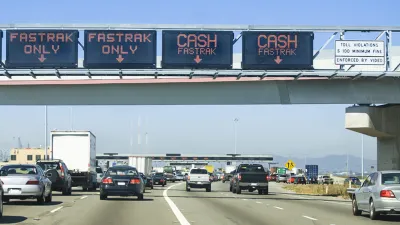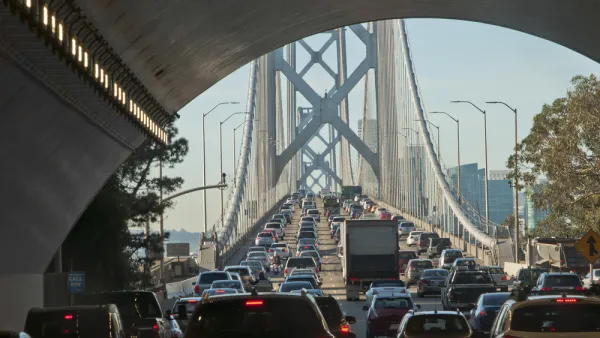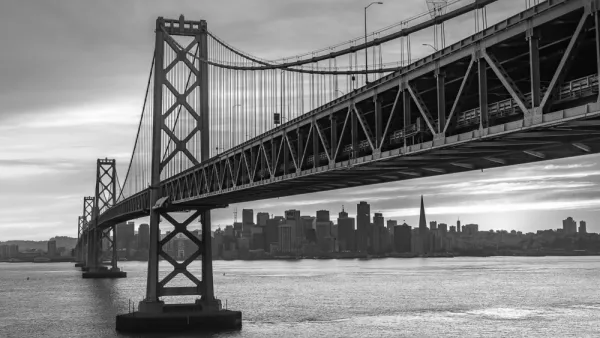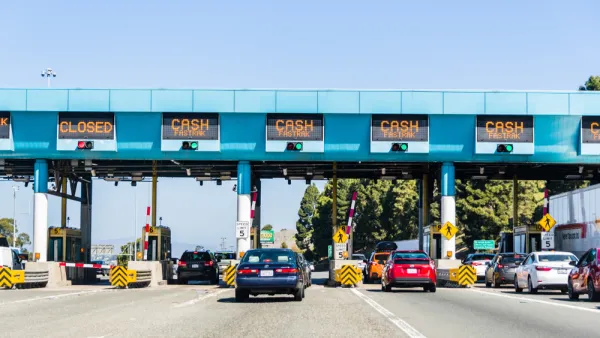A modest toll increase, $3 over six years, took a major step forward with the approval of a key Bay Area Toll Authority committee. With the exception of the Bay Bridge, the round-trip toll on each of the region's seven state-owned bridges is $5.

The July 2010 photo of the toll on the Bay Bridge between San Francisco and Oakland appearing in the San Francisco Chronicle article says it all: motorists crossing the seven, state-owned toll bridges in the Bay Area (does not include Golden Gate Bridge) pay the same toll today that they paid over seven years ago, unlike transit patrons that may see their fares raised annually or biennially.
If approved by a majority of voters in the region's nine counties (unlike transportation sales tax measures which require a two-thirds majority), the $5 toll on six of the bridges would increase by $1 next year, with subsequent $1 hikes in 2022 and 2025, reports Lizzie Johnson on Jan. 10. The $6 peak-hour toll, and $4 off-peak toll, on the Bay Bridge would increase by the same increment at the same intervals.
But to get before voters, the [Bay Area Toll Authority Oversight Committee's] recommendation will need approval from the full Bay Area Toll Authority which usually follows the committee’s lead. A vote is expected Jan. 24.
If the authority gives the measure the go-ahead, the Board of Supervisors in each of the nine affected counties will make the final vote to place it on each county’s ballot for June 5 as Regional Measure 3.
The toll increase would raise about $4.5 billion over 30 years to pay for a wide range of projects, writes Johnson. According to an email by Rebecca Long, manager of government relations for the Metropolitan Transportation Commission, the parent agency of the toll authority, "[w]hen operating funds are included over 25 years, the final mode split is 69% transit, 25% highway (interchange improvements, express lanes and some safety projects), 3% multimodal (Goods movement/Mitigation) & 3% bike/ped."
The three most costly projects are BART expansion cars ($500 million), BART to San Jose phase 2 ($375 million), and Caltrain downtown San Francisco extension, $325 million.
Regional Measure 3 is based on legislation, SB 595 by Sen. Jim Beall (D-San Jose), signed by Gov. Jerry Brown last October. It be the first time that all nine counties would vote to hike tolls. Regional Measure 1 in 1988, which hiked tolls to $1 for all seven bridges, and Regional Measure 2 in 2004, a $1 toll increase, appeared on ballots in seven counties, with Napa and Sonoma not participating. Tolls were also raised legislatively by $1 on three occasions for seismic retrofit purposes.
FULL STORY: Proposal for $9 tolls on Bay Bridge, $8 on other bridges gets big boost

Analysis: Cybertruck Fatality Rate Far Exceeds That of Ford Pinto
The Tesla Cybertruck was recalled seven times last year.

National Parks Layoffs Will Cause Communities to Lose Billions
Thousands of essential park workers were laid off this week, just before the busy spring break season.

Retro-silient?: America’s First “Eco-burb,” The Woodlands Turns 50
A master-planned community north of Houston offers lessons on green infrastructure and resilient design, but falls short of its founder’s lofty affordability and walkability goals.

Test News Post 1
This is a summary

Analysis: Cybertruck Fatality Rate Far Exceeds That of Ford Pinto
The Tesla Cybertruck was recalled seven times last year.

Test News Headline 46
Test for the image on the front page.
Urban Design for Planners 1: Software Tools
This six-course series explores essential urban design concepts using open source software and equips planners with the tools they need to participate fully in the urban design process.
Planning for Universal Design
Learn the tools for implementing Universal Design in planning regulations.
EMC Planning Group, Inc.
Planetizen
Planetizen
Mpact (formerly Rail~Volution)
Great Falls Development Authority, Inc.
HUDs Office of Policy Development and Research
NYU Wagner Graduate School of Public Service




























